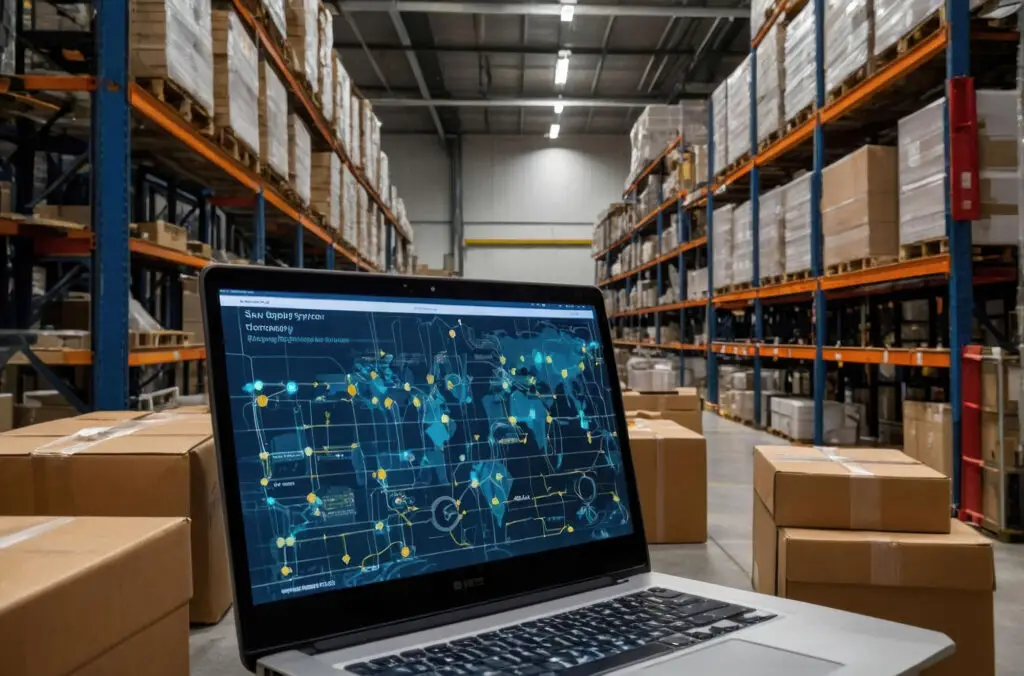Streamlined supply chain processes play a crucial role in delivering products and services on time, enhancing customer satisfaction and boosting overall profitability. A key person to the optimization of supply chain operations is the Chief Information Officer (CIO), a pivotal executive tasked with harnessing technology to improve efficiency, resilience and innovation in the supply chain network.
Importance of Supply Chain Management for Businesses
Supply chain management requires overseeing the entire process of sourcing, manufacturing and providing goods or services to customers. It is essential for defining a company’s competitiveness, cost-effectiveness and ability to satisfy customer needs. A well-managed supply chain empowers businesses to streamline their processes, reduce expenditures, as well as adapt quickly to market dynamics and shifting consumer preferences.
Overview of the CIO’s Pivotal Role in Optimizing Supply Chain Operations
In today’s digital era, the role of the Chief Information Officer (CIO) expands beyond standard IT functions. As key players, CIOs employ expertise in leveraging innovations to elevate supply chain functions as strategic assets. They collaborate closely with business leaders to identify opportunities for innovation, automation and integration of digital solutions that enhance supply chain visibility, efficiency and agility. CIOs also foster collaboration with cross-functional teams to establish intelligent systems supporting strategic decision making and continued optimization of end-to-end operations.
Understanding Supply Chain Challenges
In the complex world of global trade and commerce, supply chains are vulnerable to multiple challenges that can slow down efficiency and disrupt operations. Understanding these challenges is crucial for organizations to proactively mitigate risks and build resilient supply chain systems.
Overview of Common Supply Chain Issues Faced by Businesses
There are many different types of supply chain issues, such as unstable demand, interrupted supply chains, difficult inventory management and bottlenecks. Events in geopolitics, natural disasters, shifting consumer behavior and economic changes are some of the causes of these problems. If ignored, they may result in more expenses, longer wait times and a loss of competitive edge.
Impact of Disruptions on Supply Chain Efficiency and Effectiveness
Supply chain disruptions can have a significant impact on customer satisfaction, inventory levels and production schedules. A port closure delaying shipments or an unexpected spike in demand, taking suppliers off guard, are just two examples of how supply chain disruptions may have a domino effect leading to revenue loss and reputational damage.
Need for Strategic IT Solutions to Address Supply Chain Challenges
Strategic Information Technology (IT) solutions are essential for improving responsiveness, adaptability and visibility to ensure supply chain stability. Leveraging the right IT solutions may help organizations anticipate risks, improve inventory levels and expedite logistical operations. These tools range from cloud computing and real-time tracking technology to sophisticated analytics and artificial intelligence. As an advocate of digital transformation, the CIO is in a unique position to lead the adoption of these technologies and promote long-term enhancements in supply chain efficiency.
Leveraging Technology for Supply Chain Optimization
In the pursuit of supply chain perfection, technology emerges as an effective tool, providing innovative solutions to expedite operations, improve visibility and drive strategic decision-making.
Integration of Supply Chain Management Systems
One of the most important phases in supply chain optimization is integrating different technologies throughout the supply chain network. Modern supply chains involve numerous parties, ranging from suppliers and manufacturers to distributors and retailers. By introducing integrated supply chain management solutions, CIOs may eliminate obstacles, enable continuous data sharing and provide end-to-end visibility into supply chain activities.
Implementation of Data Analytics for Demand Forecasting and Inventory Management
Supply chain management has been transformed by data analytics, which has facilitated accurate demand forecasting and inventory optimization. Through historical information, real-time reports and simulation models, CIOs may make data-informed judgments to increase inventory turnover, minimize out-of-stocks and boost order accuracy. It also enables firms to respond effectively to market fluctuations and consumer behaviors.
Utilization of IoT and Blockchain for Supply Chain Visibility and Transparency
The combination of Internet of Things (IoT) and blockchain technologies provides unprecedented capabilities for CIOs to revolutionize supply chain visibility and tracking. IoT devices such as sensors in products, ships and warehouses provide location, condition as well as location data in real time. Blockchains, on the other hand, keep supply chains traceable and authenticate by creating transaction permanence unchangeable. By utilizing these technologies, CIOs can effectively trace goods, optimize inventory levels and increase reliance and relationships with supply chains and customers.
When CIOs combine systems, data analytics, IoT and blockchain, they can integrate actionable insights, agility as well as versatility into warehouse operations.
Enhancing Collaboration Across Departments
Collaboration between functional areas is the key to enhancing supply chain performance and ensuring the effective operation thereof. The CIO position plays an important role in motivating cross-domain collaboration and utilizing technology for communication and alignment.
Importance of Cross-Functional Collaboration in Supply Chain Management
Achieving supply chain operational efficiency demands seamless coordination and communication between departments, which include procurement, logistics, production, sales and finance. Every function has its distinct duties in the supply chain and collaboration between them leads to operational efficiency, cost efficiency and client satisfaction. In addition, it allows for superior judgment, problem-solving and effective employment of resources.
Role of the CIO in Fostering Collaboration Between IT and Other Departments
As the technology expert, the CIO plays a key role in connecting IT with other departments across the organization. By encouraging transparent communication, supporting common objectives and promoting the use of collaborative tools and platforms, the CIO can eliminate barriers between different parts of the company and nurture a culture of teamwork and innovation. Tools like project management software, communication platforms and shared data repositories enable multidisciplinary teams to collaborate efficiently and enhance supply chain processes through ongoing improvements.
Examples of Successful Collaboration Initiatives Improving Supply Chain Performance
Numerous organizations have shown the significant positive impact of collaboration on supply chain performance. For example, cross-functional teams with representatives from various departments work together on demand planning, resulting in more precise forecasting and optimized inventory. Another instance is merging sales and operations planning (S&OP) procedures, utilizing IT systems for real-time data sharing and scenario analysis, leading to improved decision-making and allocation of resources.
Through advocating for cross-functional collaboration and utilizing technology as a facilitator, CIOs can unlock synergies between departments, streamline supply chain processes and achieve concrete business results.
Ensuring Data Security and Compliance
In this modern digital era, businesses operating within intricate supply chain networks must prioritize regulatory compliance and data security. The Chief Information Officer (CIO) plays an important role in implementing robust data security measures to protect sensitive information and ensure adherence to industry regulations.
Risks Associated with Data Security Breaches in the Supply Chain
Supply chains face various cybersecurity risks, such as insider threats, data breaches and ransomware. The interlinked nature of supply chain ecosystems exposes organizations to vulnerabilities like operational disruptions, damage to reputation and unauthorized data access. Data security breaches can jeopardize crucial information concerning business activities, customers as well as suppliers, resulting in legal issues and financial implications.
Strategies for Mitigating Cybersecurity Threats and Ensuring Compliance
To prevent cybersecurity risks in the supply chain, organizations should carry out strong security protocols and proactive measures. Partnerships between the CIO, stakeholders and cybersecurity experts is vital in implementing the following strategies:
- Access Controls and Encryption: Deploy encryption methods and access controls to protect data during storage and transit.
- Employee Training and Awareness: Conduct cybersecurity training to employees, educating them on best practices and alerting them to risks like social engineering and phishing.
- Routine Security Checks: Perform vulnerability evaluations and regular security checks to pinpoint and rectify potential weaknesses in the supply chain network.
- Regulatory Compliance: Comply to industry-specific regulations like PCI DSS, GDPR and HIPAA to safeguard confidential data and uphold stakeholder trust.
Role of the CIO in Implementing Robust Data Security Measures
As the technology infrastructure leader, the CIO is in charge of establishing and implementing comprehensive data security protocols throughout the supply chain. This includes implementing advanced security tools, developing incident response policies and cultivating a security-conscious culture within the firm. In addition, the CIO should work closely with legal and compliance teams to ensure that data protection legislation and standards are followed.
Organizations may mitigate risks, develop resilience while increasing confidence among supply chain partners as well as customers by putting data security and compliance first.
Driving Innovation and Agility
Innovation and agility are critical components of a modern supply chain strategy, allowing businesses to respond quickly to market changes and provide excellent client experiences. The CIO plays a critical role in pushing technology innovation inside the supply chain.
Importance of Innovation in Supply Chain Management
Innovation drives competitiveness and opens up new options for efficiency and growth in supply chain operations. Organizations may streamline operations, decrease costs and establish differentiated value propositions by adopting emerging technology and innovative techniques. Automation, predictive analytics, AI-driven decision-making and collaborative platforms are all examples of supply chain management innovation that allows organizations to stay ahead of the competition.
Role of the CIO in Driving Technological Innovation Within the Supply Chain
As a driver for digital transformation, the CIO is uniquely positioned to push technical innovation throughout the supply chain. By collaborating with supply chain stakeholders and business executives, the CIO may discover opportunities for innovation and implement cutting-edge solutions to help improve visibility, efficiency and customer happiness. Whether employing robotics or using AI-powered demand forecasting for warehouse automation, the CIO’s strategic vision and technical expertise help shape the future of supply chain management.
Strategies for Enhancing Supply Chain Agility to Respond to Market Changes
Agility refers to the capacity of responding quickly and efficiently to ever-changing market demand, customer needs and unexpected disruptions. CIOs can promote supply chain agility by:
- Adapting cloud-based technologies to enhance adaptability and scalability.
- Using real-time data analytics for monitoring and adapting to market movements.
- Utilizing collaborative platforms and tools to facilitate communication and agile decision-making.
- Establishing cross-functional teams to promote continuous innovation and improvement.
Through advocating for innovation and cultivating agility within the supply chain, CIOs can position their organizations for competitiveness and ongoing growth.
Implementing Sustainable Practices
The growing emphasis on sustainability presents both challenges and opportunities for supply chain management. CIOs have a pivotal role to play in implementing eco-friendly practices and leveraging technology to drive sustainable initiatives within the supply chain ecosystem.
Growing Importance of Sustainability in Supply Chain Management
Sustainability has emerged as a top priority for organizations looking to lessen their environmental effect, carbon footprint and satisfy changing regulatory requirements. Sustainable supply chain operations include activities like:
- Efficient transportation and logistics result to lower greenhouse gas emissions.
- Maximizing resource usage and reducing waste in manufacturing and distribution.
- Promoting ethical and responsible procurement practices.
- Promoting renewable energy and eco-friendly packaging.
Adopting sustainable practices not only reduces environmental hazards, but also boosts brand reputation and attracts eco-conscious investors and consumers.
Role of the CIO in Implementing Sustainable IT Solutions
The CIO may drive sustainability initiatives by using technology to lower energy use, lessen paper waste, as well as promote remote work and virtual collaboration. Key strategies include:
- Virtualizing IT infrastructure to reduce physical hardware and energy use.
- Setting up energy-efficient data centers and cloud computing technologies.
- Use digital document management technologies to minimize paper waste.
- Encourage remote collaboration and teleconferencing to reduce carbon emissions associated with travel.
By incorporating sustainability into IT operations and plans, the CIO may contribute substantially to the organization’s overall environmental awareness and sustainability objectives.
Examples of Businesses Implementing Eco-Friendly Supply Chain Practices with IT Support
Several innovative companies have shown leadership by implementing eco-friendly supply chain practices using IT innovation.
For example:
- Walmart uses data analytics and IoT sensors to lower carbon emissions, optimize transportation routes and decrease fuel consumption.
- IKEA employs blockchain technology to track raw material sources and encourage responsible sourcing.
- Amazon invests in renewable energy projects to power its fulfillment centers and data centers, resulting in lower carbon footprint.
These instances emphasize the transformative influence of sustainable IT solutions on supply chain sustainability and corporate social responsibility.
To summarize, the CIO’s role in implementing sustainable practices is critical to achieving positive environmental results while improving supply chain efficiency and resilience. Organizations can create value for stakeholders and contribute to a more sustainable future.
Looking for CIOs near you? Contact The THOR Group
CIOs are the key to unlocking new opportunities and driving growth. As experts in technology leadership and strategy, they optimize IT infrastructure and enhance business processes. If your company needs experienced CIOs, The THOR Group can provide leaders who drive success within your organization.
The THOR Group is a reliable partner for businesses aiming to stay competitive in the tech industry. We deliver CIOs with advanced technical skills and strategic insight. These professionals are available for consulting, contracting, or direct hire basis. Contact us today to unlock the full potential of technology leadership for your company’s success!
Staffing Made Effortless. Let the Experts Handle Your Hiring
Helping companies discover the perfect talent for their needs. Finding the right individuals to drive your success is what we excel at.





